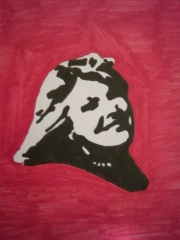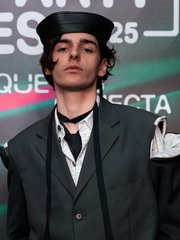


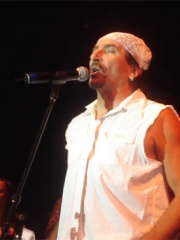
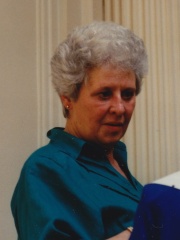

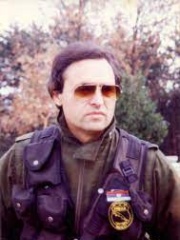

The Most Famous
SINGERS from Bosnia and Herzegovina
This page contains a list of the greatest Bosnian, Herzegovinian Singers. The pantheon dataset contains 4,381 Singers, 33 of which were born in Bosnia and Herzegovina. This makes Bosnia and Herzegovina the birth place of the 29th most number of Singers behind Mexico, and Portugal.
Top 10
The following people are considered by Pantheon to be the top 10 most legendary Bosnian, Herzegovinian Singers of all time. This list of famous Bosnian, Herzegovinian Singers is sorted by HPI (Historical Popularity Index), a metric that aggregates information on a biography's online popularity. Visit the rankings page to view the entire list of Bosnian, Herzegovinian Singers.

1. Lepa Brena (b. 1960)
With an HPI of 67.15, Lepa Brena is the most famous Bosnian, Herzegovinian Singer. Her biography has been translated into 36 different languages on wikipedia.
Fahreta Živojinović (née Jahić; Serbo-Croatian Cyrillic: Фахрета Живојиновић, née Јахић; born 20 October 1960), known by her stage name Lepa Brena (Serbo-Croatian Cyrillic: Лепа Брена), is a Yugoslav singer, actress, and businesswoman. With around 40 million sold records, she is regarded as the most commercially successful recording artist from the former Yugoslavia. Brena is also often credited with creating the turbo-folk genre with her first two albums Čačak, Čačak (1982) and Mile voli disko (1982). Lepa Brena grew up in Brčko, Bosnia and Herzegovina, but has lived in Belgrade, Serbia since 1980, where she started her career. Lepa Brena is considered to be a symbol of the former Yugoslavia, due to the fact that she was one of the last popular acts to emerge before the breakup of the country. She has described herself as being "Yugo-nostalgic". Along with her husband, Slobodan Živojinović and friend, Saša Popović, Brena co-founded and co-owned Grand Production, the biggest record label and production company in the Balkans. In 2019, they decided to sell Grand Production for €30 million.

2. Dino Merlin (b. 1962)
With an HPI of 64.73, Dino Merlin is the 2nd most famous Bosnian, Herzegovinian Singer. His biography has been translated into 39 different languages.
Edin Dervišhalidović (born 12 September 1962), known professionally as Dino Merlin, is a Bosnian singer-songwriter and record producer. Nicknamed "The Wizard" (Bosnian: Čarobnjak), he is widely regarded as one of the most prominent and commercially successful artists to have emerged from the former Yugoslavia. Born in Sarajevo in 1962, Dino founded and led the band Merlin, one of the best-selling rock groups in Southeast Europe. Deemed a cultural icon, he has released over a dozen chart-topping albums, embarked on numerous record-breaking tours, received numerous accolades, including the prestigious Sixth of April Sarajevo Award, and authored the national anthem of the Republic of Bosnia and Herzegovina. He is celebrated for his distinctive voice, charismatic stage presence, and poetic songwriting.

3. Zdravko Čolić (b. 1951)
With an HPI of 64.23, Zdravko Čolić is the 3rd most famous Bosnian, Herzegovinian Singer. His biography has been translated into 26 different languages.
Zdravko Čolić (Serbian Cyrillic: Здравко Чолић, pronounced [zdrǎːv̞.kɔ̝ t͡ʃɔ̝̌ː.lit͡ɕ]; born 30 May 1951) is a Bosnian and Serbian pop singer who is widely considered one of the greatest vocalists and cultural icons of the former Yugoslavia. He has been compared to Paul McCartney and Tom Jones by music critics and the general public. He has garnered fame in Southeastern Europe for his emotionally expressive tenor voice, fluent stage presence and numerous critically and commercially acclaimed albums and singles. Among his songs, "Ti si mi u krvi" (You're In My Blood), from the eponymous album, is widely considered one of the most popular ballads of ex-Yugoslav music.

4. Željko Bebek (b. 1945)
With an HPI of 63.40, Željko Bebek is the 4th most famous Bosnian, Herzegovinian Singer. His biography has been translated into 17 different languages.
Želimir "Željko" Bebek (born 16 December 1945) is a Bosnian and Croatian vocalist and musician most notable for being the lead singer of the Yugoslav rock band Bijelo Dugme from 1974 until 1984. He has since maintained a successful folk-pop solo career.
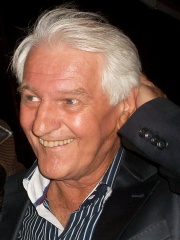
5. Kemal Monteno (1948 - 2015)
With an HPI of 63.24, Kemal Monteno is the 5th most famous Bosnian, Herzegovinian Singer. Her biography has been translated into 22 different languages.
Kemal Monteno (17 September 1948 – 21 January 2015) was a Bosnian recording artist and singer-songwriter whose career stretched from the 1960s to the 2010s. He is widely considered one of the greatest songwriters of the former Yugoslavia. Monteno wrote songs for other performers as well, most notably Zdravko Čolić, Toše Proeski, and the rock band Indexi.

6. Sena Jurinac (1921 - 2011)
With an HPI of 62.77, Sena Jurinac is the 6th most famous Bosnian, Herzegovinian Singer. Her biography has been translated into 23 different languages.
Srebrenka "Sena" Jurinac (Croatian pronunciation: [srêbreːŋka sěːna jurǐːnat͜s]) (24 October 1921 – 22 November 2011) was a Bosnian-born Austrian operatic soprano.

7. Halid Bešlić (1953 - 2025)
With an HPI of 60.36, Halid Bešlić is the 7th most famous Bosnian, Herzegovinian Singer. His biography has been translated into 19 different languages.
Halid Bešlić (Bosnian pronunciation: [xǎːlid bɛ̂ʃlitɕ]; 20 November 1953 – 7 October 2025) was a Bosnian folk singer and musician whose career spanned nearly five decades. Renowned for his distinctive baritone voice and emotive delivery, he became one of the most influential and best-selling performers in the former Yugoslavia and throughout the Balkans. Rising to prominence in the early 1980s with the albums Sijedi starac (1981), Pjesma samo o njoj (1982) and Dijamanti... (1984), Bešlić developed a devoted following across the Balkans and among the Bosnian diaspora. He released more than a dozen studio albums and performed widely across Europe and North America. During the Bosnian War, Bešlić organized and took part in numerous humanitarian concerts for displaced persons and war victims. In 2009, he survived a serious car crash that left him with lasting injuries but continued to perform and record in the following years. Bešlić's work is regarded as an important contribution to Bosnian musical and cultural heritage, and he remained a regional cultural icon until his death in Sarajevo in 2025.

8. Rodoljub Roki Vulović (b. 1955)
With an HPI of 59.81, Rodoljub Roki Vulović is the 8th most famous Bosnian, Herzegovinian Singer. His biography has been translated into 23 different languages.
Rodoljub Vulović (Serbian Cyrillic: Родољуб Вуловић; born on 1 May 1955), more commonly known by his stage name Roki Vulović (Serbian Cyrillic: Роки Вуловић), is a Bosnian Serb folk singer and songwriter. He is often described as a turbo-folk singer and is known for his Serbian war songs. He is best known for his 1992 album Semberski junaci and the single "Panteri – Mauzer" about the Garda Panteri, the most elite unit of the Army of Republika Srpska.

9. Davorin Popović (1946 - 2001)
With an HPI of 59.10, Davorin Popović is the 9th most famous Bosnian, Herzegovinian Singer. Her biography has been translated into 15 different languages.
Davorin Popović (23 September 1946 – 18 June 2001) was a Bosnian singer and songwriter. Born in Sarajevo and well known throughout the former Yugoslavia, he is considered to be one of the greatest rock singers of the region. Popović was the lead singer and frontman of the progressive and pop rock band Indexi throughout most of their career. The band would become founders of a specific music style in the former Yugoslavia, known as "Sarajevo pop-rock school", which later influenced other bands and singers in Sarajevo and other parts of Yugoslavia.

10. Ljiljana Petrović (1939 - 2020)
With an HPI of 58.52, Ljiljana Petrović is the 10th most famous Bosnian, Herzegovinian Singer. Her biography has been translated into 19 different languages.
Ljiljana Petrović (Serbian Cyrillic: Љиљана Петровић; 1939 – 4 February 2020) was a Serbian singer. She was born in Bosanski Brod, but was brought up in Novi Sad. She began to sing at local clubs and restaurants, and performed at a festival in Mali Lošinj in 1960, where she was noticed by the head of the artists and repertoire division at the record label Jugoton. In 1961, Petrović represented Yugoslavia in the Eurovision Song Contest 1961 with the song "Neke davne zvezde" (Some ancient stars). Petrović finished in 8th place receiving 9 points. Subsequently, she continued to record music until the late 1970s, at which point she retired from public life until the late 1980s, when she became an author, releasing a book of poetry in 1991. Petrović died on 4 February 2020, aged 81.
People
Pantheon has 33 people classified as Bosnian, Herzegovinian singers born between 1921 and 2004. Of these 33, 26 (78.79%) of them are still alive today. The most famous living Bosnian, Herzegovinian singers include Lepa Brena, Dino Merlin, and Zdravko Čolić. The most famous deceased Bosnian, Herzegovinian singers include Kemal Monteno, Sena Jurinac, and Halid Bešlić. As of April 2024, 7 new Bosnian, Herzegovinian singers have been added to Pantheon including Amila Glamočak, Donna Ares, and Edo Maajka.
Living Bosnian, Herzegovinian Singers
Go to all RankingsLepa Brena
1960 - Present
HPI: 67.15
Dino Merlin
1962 - Present
HPI: 64.73
Zdravko Čolić
1951 - Present
HPI: 64.23
Željko Bebek
1945 - Present
HPI: 63.40
Rodoljub Roki Vulović
1955 - Present
HPI: 59.81
Seid Memić Vajta
1950 - Present
HPI: 57.97
Hanka Paldum
1956 - Present
HPI: 57.00
Baja Mali Knindža
1966 - Present
HPI: 55.46
Elvir Laković Laka
1969 - Present
HPI: 54.63
Hari Varešanović
1961 - Present
HPI: 53.83
Boris Novković
1967 - Present
HPI: 51.79
Seka Aleksić
1981 - Present
HPI: 49.76
Deceased Bosnian, Herzegovinian Singers
Go to all RankingsKemal Monteno
1948 - 2015
HPI: 63.24
Sena Jurinac
1921 - 2011
HPI: 62.77
Halid Bešlić
1953 - 2025
HPI: 60.36
Davorin Popović
1946 - 2001
HPI: 59.10
Ljiljana Petrović
1939 - 2020
HPI: 58.52
Sabahudin Kurt
1935 - 2018
HPI: 57.55
Donna Ares
1977 - 2017
HPI: 46.64
Newly Added Bosnian, Herzegovinian Singers (2025)
Go to all RankingsAmila Glamočak
1966 - Present
HPI: 47.73
Donna Ares
1977 - 2017
HPI: 46.64
Edo Maajka
1978 - Present
HPI: 45.27
Alma Čardžić
1968 - Present
HPI: 42.64
Maya Berović
1987 - Present
HPI: 42.52
Sandra Bagarić
1974 - Present
HPI: 40.36
Marko Bošnjak
2004 - Present
HPI: 39.50
Overlapping Lives
Which Singers were alive at the same time? This visualization shows the lifespans of the 6 most globally memorable Singers since 1700.


